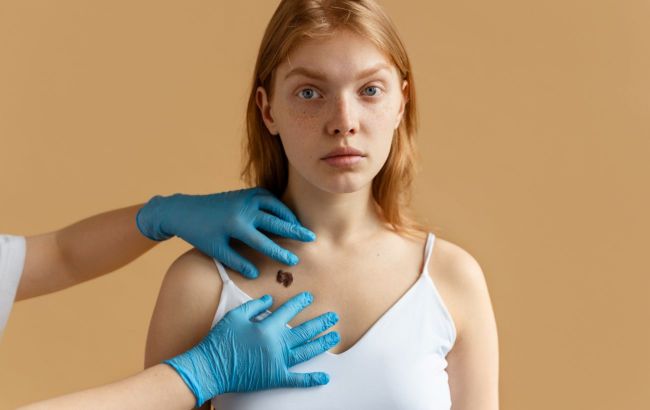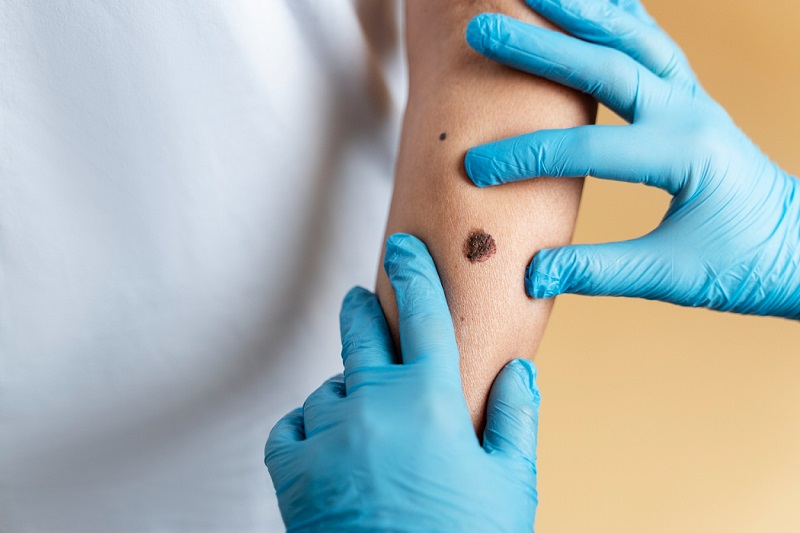What is melanoma and why is it dangerous? Dermatologist explains
 Melanoma is malignant, as it can metastasize (photo: Freepik)
Melanoma is malignant, as it can metastasize (photo: Freepik)
Melanoma often bothers people, but sometimes those who have it may not be aware of the problem as their quality of life is not affected in any way. The dermatologist Natali Ilchuk speaks about it on the health blog on Instagram and YouTube channel Healthy Conversation.
She discusses the danger of melanoma, explains how to spot it, and how to deal with it.
What is melanoma, and how to spot it
Melanoma is a formation that develops from pigment cells that produce melanin, but not all moles and pigmented spots can lead to cancer.
According to Ilchuk, it is necessary to undergo preventive dermatoscopy once a year, which is recommended for everyone. However, there are no specific signs to determine melanoma.
But there is a rule for patients, known as ABCDE.
- A - Asymmetry
- B - Borders
- C - Color
- D - Diameter over 6 millimeters
- E - Evolving
These signs usually characterize melanoma not at its early stages. Therefore, for doctors, this method is not a means of identifying melanoma at an early stage.

Dermatologist suggests undergoing preventive dermatoscopy once a year (photo: Freepik)
"It's better to undergo dermatoscopy once a year; it's usually more informative when we look with a special device. If it's manual, it magnifies the view by X10, and if it's a digital device, it's X100-X200. There are certain structural features that allow us to suspect some malignant skin formation at early stages," shares the experience of the dermatologist.
Is melanoma hereditary or acquired
The dermatologist listed several factors influencing the occurrence of melanoma and added that heredity plays a role and is a factor in the development of melanoma:
- If there are more than 50 moles on the body, it's already one of the aggravating factors, indicating a greater predisposition to the development of malignant formations.
- If close relatives had any malignant formations, it's also a predisposing factor for the development of melanoma.
- If there were any malignant formations, such as basal cell carcinoma (a type of skin cancer), the risk of developing melanoma is higher.
However, there is another factor in the appearance of melanoma, and fortunately, we can influence it. It's ultraviolet radiation. Prolonged exposure to the sun, and sunburns, can provoke melanoma.
According to the dermatologist, sunburns in childhood are the most significant risk for the manifestation of melanoma in adulthood.
Heredity is one of the factors in the development of melanoma (Photo: Freepik)
Is melanoma really dangerous?
"Melanoma is not the most common skin cancer, but it is the most malignant and dangerous, as it metastasizes to all organs and systems," noted the doctor.
However, if detected at early stages, treatment often requires only surgical intervention. This is referred to as Melanoma In Situ. In this case, it is usually sufficient to remove it and send it for examination to monitor the situation.
But if melanoma is identified following the ABCDE rule, indicating that it is clinically visible, it implies a significant depth of growth inside, and there is a higher risk of metastasis. In such cases, various treatments may be applied, including surgery and chemotherapy.
It is worth mentioning that earlier we wrote about acne, and the dermatologist explained if the acne face map is a myth or reality.
This material is for informational purposes only and should not be used for medical diagnosis or self-treatment. Our goal is to provide readers with accurate information about symptoms, causes, and methods of detecting diseases. RBС-Ukraine is not responsible for any diagnoses that readers may make based on materials from the resource. We do not recommend self-treatment and advise consulting a doctor in case of any health concerns.

